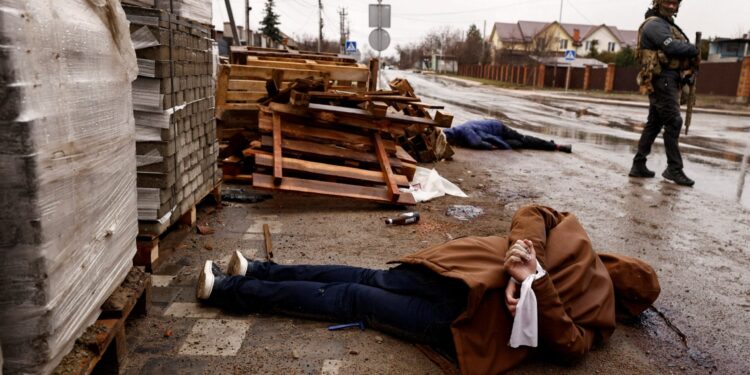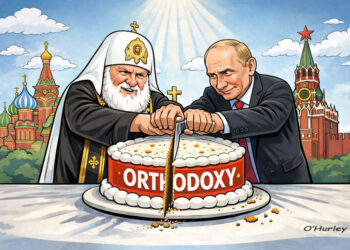by Miceál O’Hurley
DUBLIN — The current narrative of the Russian war on Ukraine still betrays how little the West understands or is willing to admit about the war. The generally clumsy and often objectively wrong language used about the war in capitals across Europe speaks volumes. There are, of course, the same empty platitudes of ‘never again’, ‘our prayers are with the people of Ukraine’ and ‘we express our solidarity’ emanating from the mouths of European leaders. This is standard fare. But in policy and action statements outright ignorance generally prevails. There is a tendency to cloth current events in self-serving political language and sound-bites designed to avoiding hard-truths permeating the media sphere. Where clarity and commitment are needed spin and evasion are too often employed.
To begin with, Russia’s war on Ukraine began 8-years ago. Not 5-weeks. 8-long, hard years. Admitting this truth when talking about Russia’s war on Ukraine is critically important. It is not about a mea culpa, though that is necessary, but about comprehension. Unless Europe owns its multitude of failures and admits to the reasons it failed so spectacularly in the lead up to this current escalation of the war by Russia nothing will change. Worse still, there remain vulnerable partners throughout Europe who are at risk of being needlessly sacrificed to Russia’s commitment to rebuilding its empire by force, invasion, occupation and annexation. Russian Federation Foreign Minister Sergeii Lavrov’s January assertion that former Soviet republics and Warsaw Pact countries were orphaned and Russia has an obligation to them seems to be forgotten. Neither Europe nor NATO can afford to remain so myopic.
Today’s news cycle is full of stories claiming that the vicious and brutal summary execution of Ukrainian civilians in places like Irpin, Hostomel, Mariupol and Bucha changes everything. Such assertions give Europe a claim to moral righteousness. Still, its commitment to actually changing things is dubious at best.
An Taoiseach Micheál Martin’s remarks to the Dáil on 1 March seems to indicate that neither he nor Ireland comprehend that Ukraine had been fighting for its survival, and that of Europe, for the better part of a decade, “Vladimir Putin, who is a bully and a thug, has unleashed an unprovoked and unjustifiable war on the people of Ukraine“. There is an implied denial in this statement of any cognition of the duration or breadth of Russia’s crimes. Of course, this narrative suits the political needs of those who have stood idly by, going about their daily business since 2014 as though nothing had really changed. True, Ireland did vote for European Union (EU) sanctions against Russia for their invasion and occupation of Luhansk, Donetsk and the attempted annexation of Crimea, but by-and-large those sanctions were so limited that merely served to allow Europe to claim action with the full knowledge the sanctions were feeble and would change nothing. The soft-soap approach to Russia’s multitudinous crimes only served to embolden Russia as the Kremlin continued to do business in Dublin, Berlin, Paris and throughout the world with barely a notice of the paltry sanctions regimes imposed upon it. In essence, Russia was treated as the epitome of the errant teenager sent to their room for being bold only to be surrounded with their devices, remaining connected to the Wi-Fi and having the same parent that scolded them bring them dinner on a tray.
Europe has long been acutely aware of Russia’s capacity for heinous crimes against humanity. In August of 1999, Vladimir Putin came to power as Russia’s Prime Minister. By the end of that very month he commenced the 2nd Chechen War against the tiny country of 1.5 million people who had been pursuing independence throughout its 200 years of Russian colonialism and Soviet domination. Journalist Thomas de Waal covered the Chechen war first-hand. Speaking in March 2022, he discussed the striking similarities between Russia’s war on Chechnya and Ukraine:
"There are some pretty disturbing parallels," said de Waal, who's now in London with the Carnegie Endowment for International Peace. "The use of heavy artillery, the indiscriminate attacking of an urban center. They bring back some pretty terrible memories for those of us who covered the Chechnya war of the 1990s."
Throughout last year’s build-up of forces by Russia on Ukraine’s border Chechen human rights activists and refugees tried desperately to warn Europe what to expect. Their pleas to be heard were dismissed, outright in capitals throughout Europe simply because a reminder of Russian brutality and penchant for human rights abuses didn’t fit the narrative that was useful to concealing Europe’s economic and energy ties to Russia. Europe wanted to pretend that Putin was a rational actor and Russia could be trusted to keep its word. Europe knew better but convinced itself otherwise, despite the insurmountable evidence indicating what would come.
Then there is Georgia. Russia, found by the Grand Chamber of the European Court of Human Rights to possess effect control over the territories it occupies by force in Georgia, notoriously engaged in the ‘ethnic cleansing’ of Georgians. The Genocide of the Georgians in Abkhazia was officially recognised by the Organization for Security and Co-operation in Europe (OSCE) conventions in 1994, 1996, and again in 1997 during the Budapest, Lisbon, and Istanbul summits, all which condemned the “perpetrators of war crimes committed during the conflict”. The perpetrators were Russia and those over whom they exercised effective control. Still, Georgia’s warnings to Europe went unheeded or unnoticed.
This is all beside the more recent litany of war crimes committed by Russia in Syria. Europe couldn’t claim it was unaware. The grotesque images of Russia’s crimes against humanity and war crimes aired ad nauseum in the daily news cycle for the past decade. Russia assisted the brutal regime of Bashir al Assad in using ‘barrel bombs’ and banned chemical weapons against civilians. Amongst their catalogue of criminality was their practice of specifically targeting humanitarian aid workers, medics and hospitals. Syrian NGOs warned Europe what to expect if Ukraine was attacked. In the article Bombed hospitals, crushed cities. What Syrians recognize in Ukraine, Ismail Al Abdullah, a Syrian, told the Christian Science Monitor:
“I wouldn’t wish Russian aggression on any person or anyplace in the world, because it is bloody, brutal, it aims to break your will to live, and it never stops,” Mr. Al Abdullah, a rescue worker with the White Helmets organization, says over WhatsApp. “I am watching the Russians trying to besiege Kyiv in the same manner they besieged Aleppo, and Homs, repeating the bombings and massacres I witnessed,” he says. “It feels frustrating to see it happening all over again.”
The humanitarian crisis Russia sparked by assisting Syria flooded Europe with evacuees and refugees on a scale that shifted the political balance across Europe, reinforcing xenophobia and giving a lift to right-wing politicians which disturb the EU to this day.
Still, Europe, including Ireland, lined-up to not only buy cheap fossil fuels from Russia, knowing the proceeds propped-up a regime marked by its enduring record of human rights abuses, but promoted Russia as a destination of choice for investment. Despite this history of Russia atrocities, and being the only European nation to invade and occupy its neighbours since World War II, and having sanctioned Russia for its invasion of Ukraine in 2014, Ireland continued to promote the growth of Irish investment in Russia. One example of this was the Kerry Group’s significant investment in a state-of-the-art processing plant outside of Moscow in 2018, 4-years after Russia’s invasion of Ukraine began. The Kerry Group, however, wasn’t an exception.
In a 4 March article in The Irish Times, journalist Mark Paul wrote the following:
“After the imposition of the more limited 2014 sanctions on Russia, but before the most recent almost all-encompassing ones, the government was still keen to tout for business for Irish companies there. Ministers, including Simon Coveney, were particularly active in this drive. A “how-to” document produced by State agency Enterprise Ireland – Access to Russia – names several smaller Irish businesses that have operations in the country. These include businesses in the technology, digital marketing, engineering and retail equipment supply sectors”.
The Irish Government’s capacity to promote Russia as a destination for investment given its human rights record and history of aggression against its neighbours was demonstrative of Ireland’s alacrity for putting its economic interests before its much vaunted “European Values”. Coveney’s personal promotion of Russia for economic development has only served to undermine his trustworthiness by Ukraine’s intelligencia and political classes.
Notwithstanding the 2014 sanctions and public rhetoric of support for Ukraine the Irish Government’s continued embrace of Russia led by Coveney as Minister of the Department of Foreign Affairs, marked an attitude of ‘business as usual’ in Dublin that betrayed claims of genuine solidarity with Ukraine. According to the Central Bank of Ireland, at the end of 2021, Irish regulated banks had exposures of on and off-balance sheet financial assets and liabilities to Russian counterparties that were worth over €1.7bn. The data also show Irish Insurance firms had a further €98m exposure to Russian entities. These figures are in addition to the €37 billion of Russian issued assets that were held in known Special Purpose Entities (SPEs) (otherwise known as Section 110 companies) registered in Ireland. These, the Central Bank said, were primarily loans issued to Russian companies by the SPE.
Data also shows there were 33 Russian-sponsored Section 110 companies with assets totaling over €35.5bn, accounting for 8% of the non-securitisation SPE-Section 110 sector. For Ireland to maintain such a disproportionate position by a single country in 2021, let alone one under broad international sanctions, created a remarkably precarious exposure for which the Irish Government was adverse to address. Russia, it seems, embraced doing business in Ireland as much as Ireland embraced Russia. There is scant evidence regulators reasonably acted to protect Ireland from any fallout.
The attraction of creating these Special Purpose Entities is their ability to launder funds while protecting the identities of the beneficial owners. They employ a scheme known as ‘Round Tipping’. This activity is made possible by Section 110 of the Taxes Consolidated Act and occurs when financial activity is processed through shell companies in ways designed to look like the company is generating revenue when it is not. These SPEs-Section 110 companies almost always lack employees and have no capital assets or physical presence in Ireland beyond a mail drop.
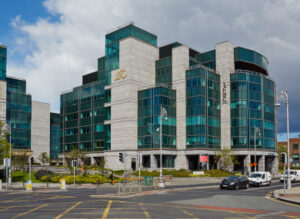
Dublin’s attraction for criminal activity and Russia money laundering has been well known to the Government for years and yet little has been done to stop it. These same corporate entities are often at the heart of Ireland’s housing crisis with Section 110 companies buying up blocks of housing before the public can access them, driving-up prices and creating a real housing shortage. The scandal of Ireland’s housing crisis, declared in 2009 as an emergency only to have grown worse in the years since, has been laid bare by the necessity of accommodating evacuees from Russia’s war on Ukraine. It is worth musing as to why Government did not address this problem given the benefit the law provided to criminals, Russia and the damage it was causing in the housing market.
The business sector likewise took its cues from Government. Companies based in the International Financial Services Centre (IFSC) in Dublin were actively involved in arranging financing for many of Russia’s state-backed and oligarch-controlled companies. This extended even to Russian companies that had previously been subjected to economic sanctions and accused of criminal activity. Indeed, reporting by Aoife Moore of the Irish Examiner, Report reveals billions funnelled to Russian firms from shell companies based in Ireland, detailed how Ireland was a known culprit in acting as a money-launderer by funneling of money to Russia without any real economic benefit to Ireland. Moore’s reporting of the independent research conducted at Trinity College Dublin exposed the nod-and-wink scheme made possible by peculiar Irish legislation and a lack of Government oversight:
"The Irish conduits examined are part of the licit economy in Ireland," the research by Cillian Doyle and Jim Stewart states. "However, the paper shows links between conduits in the study and allegations of illegal/improper activity by Russian-controlled firms. Hence, it is possible that conduits in Ireland, though totally compliant, are misused by cross-border criminal organisations.”
Fintan O’Toole’s reporting on this very issue on 1 March, Fintan O’Toole: Why is the Government stonewalling on Russian money at the IFSC?, also serves as a salient summary of how Dublin had full-knowledge it was a compliant partner with Russia’s dubious financial activities and yet sought to bury the news through linguistic acrobatics:
“… On Wednesday, just before the Russian invasion of Ukraine, Mairéad Farrell of Sinn Féin raised this urgent issue with Micheál Martin in the Dáil. The Taoiseach replied: “In respect of the IFSC, special purpose vehicles have been established there that are used in securitisations and structured finance transactions. That includes services that have been provided to some Russian entities.” He said that the Government has strengthened anti-money laundering legislation and “introduced the authorised OECD [Organisation for Economic Co-operation and Development] approach for the transfer pricing of branches and it contains the process of introducing new tax transparency measures.” This was pre-baked gobbledygook, straight from the oven of obfuscation. The Taoiseach’s verbiage cannot have been improvised. It had to be concocted in the bureaucracy. [emphasis added]
The now famed ‘Panama Papers’ leak exposed that some 322 companies, 36 clients and 17 beneficiaries of the now defunct Panamanian law firm Mossack Fonseca used Ireland as a favoured destination for doing business. Mossack Fonseca was at one time the 4th largest law firm in the world providing expert advise on off-shore accounts. In 2018, the ‘Panama Papers’ exposed their preferred use of Ireland to assist clients in evading taxes and laundering criminal assets. Despite promises of reform, Ireland didn’t close the loopholes. Consequently, it is widely believed Russia continues to use Ireland to evade sanctions by laundering money through these scandalous transactions.
Dublin’s complicity with Russia’s underhanded economic dealings was an open secret in Government Houses and the Houses of the Oireachtas. On 23 February, the day before Russia escalated their invasion of Ukraine that began in 2014, then Labour Leader Alan Kelly told the Dáil:
“We are at risk of becoming the best small country in the world to funnel corrupt dirty Russian oligarchs' money, mostly through section 110 companies that pay little, if any, tax and with no real transparency of who the beneficial owners are. Oligarchs are washing money through countries like our own because they cannot trust their own banking system because it is so corrupt. If sanctions by the US, the UK and the EU lead to a clampdown on Russian billionaires, there is a likelihood that oligarchs and their shell companies, thousands of them, may seek to use Ireland to continue to funnel money. What are we going to do about this and what is the Government going to do about it, as well?"
The question was a good one and therefore it must be asked, “Why has Ireland’s creation of these SPEs-Section 110 been so notorious as a tool for criminality and yet Ireland continues to ensure this jurisdiction remains at the use of Russia even today”?
All this brings us to the question-of-the-day, “Can Ireland, or any European nation, claim to be supportive of Ukraine while continuing to make life easier for Russia to skirt sanctions, hide assets and carry-on business as usual”?
For Ukrainian reformers, Ireland’s assertion that it is firmly in support of Ukraine is grossly undermined by its continued conduct that subsidises Russia. Ireland lauding its support for sanctions all while ensuring the back-door is open to Russia for laundering money and avoiding sanctions is not only the height of hypocrisy but an existential threat to Ukraine. Unsurprisingly, Ukraine’s President, Volodomyr Zelenskii, called-out Ireland’s lack of support for Ukraine becoming a European Union (EU) member only last week setting off a damage-control scramble in Dublin to mute the criticism.
In his recounting of pan-European support to the German parliament, Zelenskii described strong support from almost all capitals and yet conveyed his view that Dublin’s position on supporting Ukraine’s EU membership was lackluster, saying, “Ireland — well, almost”. The Irish political establishment immediately sought to play-down Zelenskii’s statement, putting it at odds with the heroic reputation Zelenskii has achieved for his alacrity in speaking truth to power in capitals across the globe. There was a scramble to release statements of support from various Ukrainian politicians and ministers accompanied by the release of what many Ukrainians saw as exploitative photographs of the Ukrainian Ambassador enjoying a night out at a football match with Simon Coveney, Micheál Martin and President Michael D. Higgins.
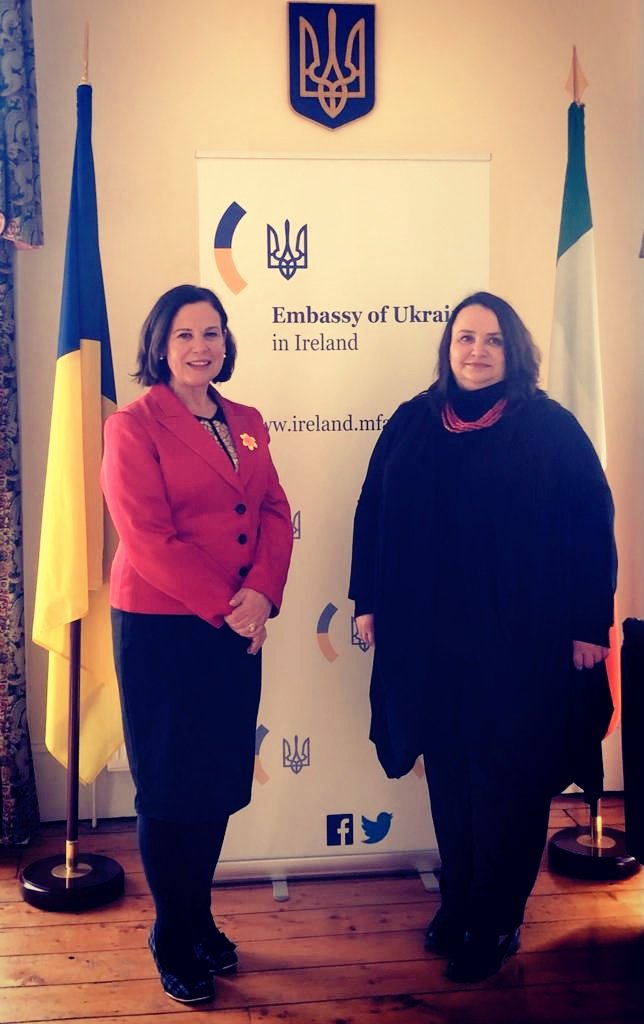
There seems to be a disconnect in understanding that there are two audiences for messaging – the political/diplomatic community and displaced Ukrainians. The charm offensive rolled out on social media meant to display solidarity between Ireland and Ukraine may have swayed many Irish people that there was no rift, but Ukrainians remain unconvinced if not alienated. Indeed, the response seems indicative of the internal divisions within Ukraine about the political failings of the country’s failure to tackle reform that would have made EU and NATO membership possible before Russia let loose its war on Ukraine. Responding on social media, Ukrainians wondered aloud why these same Irish politicians who routinely declined to attend Ukrainian events prior to February, now find it advisable to be pictured at the Ukrainian Embassy.
Teachtaí Dála keen to be photographed with Ukrainian flags are widely seen by Ukrainians as acting for their benefit, not necessarily Ukraine’s. To those in Ukraine fighting for their nation’s survival, and those who sought sanctuary beyond Ukraine’s borders, the image of politicians crowding into photographs with the Ukrainian flag or diplomats has become offensive when their timelines were absent of any real show of support over the last 8-years. Understandably, Ukrainians want to see tangible actions delivered that would make a difference in Ukraine’s chance for survival and for improving their lives sleeping in makeshift shelters. Pictures and and platitudes are meaningless to them and their memories of lacking support beyond paltry sanctions over the past 8-years is not forgotten.
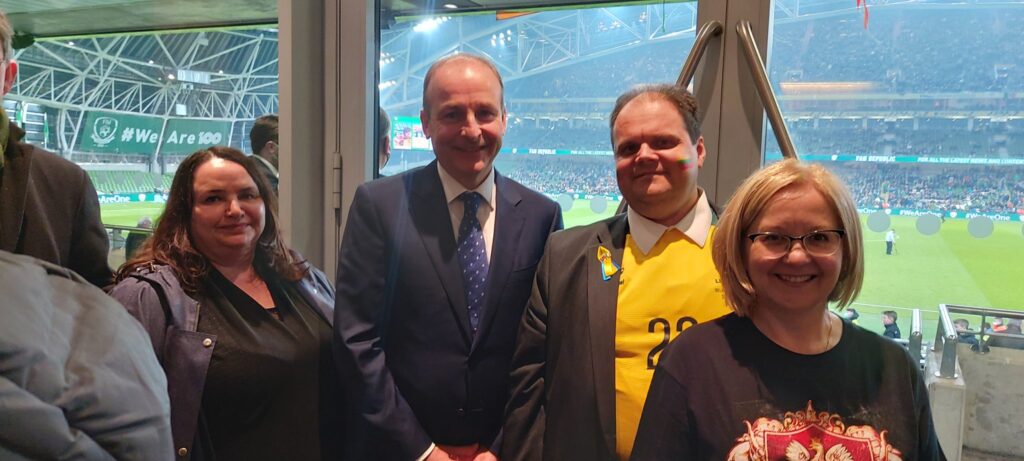
The optics of their Ambassador enjoying a leisurely night-out attending a recreational football match with Irish politicians has proven a misjudgment. While it did demonstrate friendly access to the highest echelons of political power in Ireland, with admission prices over €80 per seat, enjoying such a luxury while Ukrainians who lost everything sleep on Fire Station floors awaiting access to a payment stirred resentment. One evacuee described it as “Nepryyemno, ale zazvychay” (disappointing, but usual). Evacuees in shelters who declined to be identified out of concern for their vulnerability were almost unanimous in expressing their failure to understand why attending a football match together was possible but not a visit shelters. Fair or not, the photos cut different ways in different forums.
This was not the only misstep cited by Ukrainians. An Taoiseach Micheál Martin aggressively parried Zelenskii’s criticism, dismissively urging the public not to read too much into his criticism of Government’s support, “I am not going to surmise in terms of whatever particular take you would take from the use ‘almost’ or ‘practically’. We are a militarily-neutral country, but again we facilitated the EU Peace Facility, which has been of enormous support to the Ukrainian people… I wouldn’t overstate it, quite frankly.”
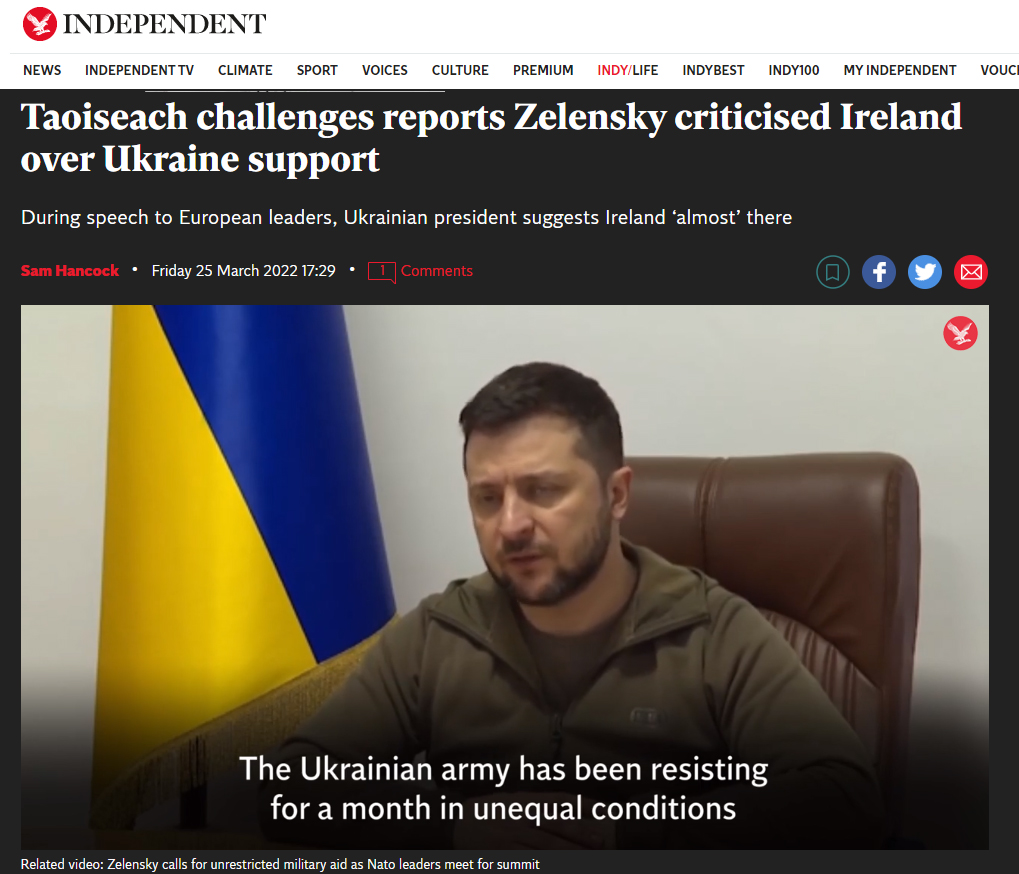
The Irish PR offensive to dismiss Zelenskii’s criticism alienated many Ukrainians. Zelenskii has proven himself a wartime President who has cemented his place in Ukrainian history. Dismissing his criticism appeared akin to “man-splaining” by a politician living in the safety and comfort of Dublin. For many, it felt like an attempt to undermine both Zelenskii’s and Ukraine’s agency. Ireland has little appetite for criticism.
Martin wholly evaded the issue of EU membership by directing his remarks at humanitarian issues. In so doing he almost underscored if not legitimised Zelenskii’s criticism of Ireland’s lack of clarity on its support for Ukraine’s EU membership bid. Zelenskii clearly and meaningfully called-out Ireland for its lukewarm support. Ireland simply countered with an answer to a question not asked. Ukrainians saw it for what it was. In all, from evasive statements of support to photographs meant to convey solidarity in the hopes of quelling criticism of Ireland by Zelenskii proved misguided. It may have met Irish objectives but resulted in alienating displaced Ukrainian’s living in desperate conditions or still fighting for their future.
The period before Russia’s recent escalation of its war against Ukraine was marked by Ireland’s complacency and laissez-faire attitude towards Kyiv and embrace of Moscow. It is problematic. If Dublin felt it was sufficient to claim solidarity with Ukraine prior to 24 February while continuing to facilitate and promote business with Russia it needs to disabuse itself of that practice immediately. The lack of clarity and moral certitude in Ireland’s foreign policy must be made a thing of the past. Russia’s threat to other European countries and Europe itself is palpable.
"Please, I would like you to show more leadership in our anti-war coalition. I would like to ask you to convince EU partners to introduce more rigid sanctions against Russia to make sure the Russian war machine will stop. "We have to put an end to trading with Russia. We have to cut ties of the Russian banks to the global system and cut the sources of their income from oil that they use for their weapons and killing," he said.
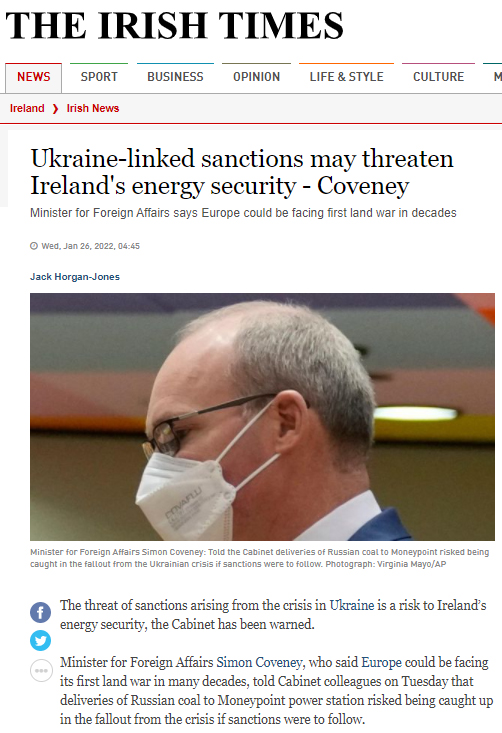 Zelenskii’s highlighting of Ireland’s continued economic ties to Russia is a stinging rebuke of Ireland’s continued subsidy of what he called the “Russian war machine“.
Zelenskii’s highlighting of Ireland’s continued economic ties to Russia is a stinging rebuke of Ireland’s continued subsidy of what he called the “Russian war machine“.
Consider that on 22 January, only 1-month before Russia launched the massive invasion of the Ukrainian interior, Foreign Affairs Minister Simon Coveney advised the Cabinet to decline Ukraine’s request to impose sanctions on Russia. Coveney cited Ireland’s dependence on Russian coal deliveries to the Moneypoint power station and advised the Cabinet not to risk Russia’s ire by attempting to avoid war by putting pressure on Moscow with sanctions. Yesterday, ESB announced it would no longer purchase Russian coal. It is difficult to believe that this same decision could not have been made 5-weeks ago. Ireland’s continued reliance on Russia fossil fuels throughout its 8-year war on Ukraine is hardly an act of solidarity. Keen observers would agree that it would not have been Ukraine-linked sanctions that threatened Ireland’s energy security but rather Ireland’s refusal to divest itself from its over-reliance on dirty Russian fossil fuels over the past decade. Ukraine was not the problem – Ireland’s poor policies and relationship with Russia was the problem.
Overall, Ireland prioritsed its economic relationship with Russia over the security and freedom of another European nation, Ukraine. Even as Russia was poised to escalate the war this year, the best that Ireland could do was stand by without taking preventative action. As late as 26 January a Government spokesperson said “the situation regarding Russia and Ukraine is under continuous close assessment by all relevant departments across Government”.
There is nothing surprising about a nation acting in its self-interest. In Ireland’s case it decision to continue relying on dirty Russian coal and doing business with a despot, authoritarian regime known for murder, summary executions, being the only European nation to invade and occupy its neighbours since World War II and conducting spying operations on Irish soil under the guise of diplomacy was surprising for 2-reasons. Ireland likes to be seen as an advocate for human rights and the rule of law. It also occupies a seat on the United Nations Security Council. So it is surprising that Ireland chose to prioritise the ability to do business with Russia over morality, the rule of law, human rights and the security of a sovereign nation. Now desiring that this be overlooked because it is meeting its humanitarian aid obligations is understandable, but unacceptable.
Dublin, like Berlin, Paris and other European capitals ensured Ukraine was gelded, leaving it unnecessarily vulnerable to Russian military exploitation. There is a price to be paid for such decisions. Dublin is paying it now in terms of having to accept the flood of evacuees because Ukraine was deprived of the ability to defend itself. It will cause social stress and push Irish infrastructure to past its already precarious status. Energy prices are skyrocketing. Banks will be stressed by the impact of Russia default. Trade will become more costly and food shortages are on the horizon. The cost of Europe prioritizing Russia over Ukraine will haunt the continent for years to come and require rethinking security.
The question remains as to why Dublin and other European capitals chose to close their eyes to the dangers of doing business with a murderous regime like Russia while holding democratic societies like Ukraine, Moldova and Georgia on the periphery.
For years, NATO and the EU were mistaken in believing that the mere open-door policies for membership each offered were sufficient demonstrations of their commitment to democracy, freedom, human rights and national sovereignty in Europe. Each was mistaken. Russia understood this, took it for the faint support it was and exploited it to their advantage. The lack of urgent preventative diplomacy throughout Europe, even after Moldova’s Transnistria was occupied by Russia, or after Georgia’s Tskhinvali and Abkhazia regions were invaded and occupied by Russia only served as an invitation for the Kremlin to repeat such barbarism. After all, from rewarding Russia with Olympic games to European football matches and paltry sanctions, Russia could hardly be criticised for taking such weak-willed demonstrations of rebuke as more than a slap-on-the-wrist.
The EU’s ‘Proximity Policy’ which offered some participation in the EU without membership, offered to Ukraine, Georgia and Moldova as the ‘Eastern Partnership’ was little more than a proclamation that Europe sought to use aspiring applications for EU membership as geographic and economic buffer zones without authentically embracing the reality that membership would be forthcoming. Indeed, almost every conference and webinar in which Ireland participated prior to 24 February included a Department of Foreign Affairs official stating unequivocally for the record, “The Eastern Partnership is not a promise of membership”, as though the stakeholders were not aware.
Ireland’s rhetoric about the war demonstrates a continued and disappointing lack of understanding. Russia’s widening of the war by attacking civilian population centres across Ukraine on 24 February came in the 8th year of Russian’s war on Ukraine and after equally monstrous attacks on civilians in Chechnya, Georgia and Syria. Of course, pretending the war only started last month is an endeavour to excuse Europe’s complacency and evade accountability. Employing language that conveys that Russia unleashed an “unprovoked and unjustifiable war on the people of Ukraine in February 2022”, Ireland and the European Union plays into the Russian propaganda.
What took place back in 2014 was an “unprovoked and unjustifiable war on the people of Ukraine” that too many across Europe were willing to treat as a historic, internal dispute. Ireland’s continued promotion of business with Russia since 2018, whose chief cheerleader was Foreign Affairs Minister Simon Coveney, belies all of its rhetoric about freedom, democracy, values and sovereignty. Ireland and the rest of Europe must answer as to why the 14,000 Ukrainians who died fighting for their survival against the Russian invasion that began 8-years ago, or the 1.5 million internally displaced persons whose homes were destroyed or taken in Russia’s attempt to resurrect its former empire, were not as deserving of Europe’s deep sanctions and support as those being slaughtered by Russia today.
Europe missed endless opportunities to avoid this war and yet failed, spectacularly, in every measurable way possible. There was NATO’s habit of using nations on the periphery of its borders for its own purposes. It dangled NATO membership before Ukraine without ever really working to make it a reality. NATO and Europe knew at the time this offer would go unfulfilled. In the years since George W. Bush effectively put it on offer NATO did not make any real commitment to make Ukraine’s NATO membership a reality. It remained simply another plank in NATO’s policy arsenal in dealing with Russia. Still, Ukraine should not have waited until this month to admit NATO membership was unrealistic.
Then there is the non-committal policy embraced by the European Union (EU). Claiming ‘expansion fatigue’, the EU created what came to be known as a ‘proximity policy’ which would offer trade and other benefits to countries without actually providing a path to membership. The very idea of ‘proximity’ spoke candidly about the geographic interest the EU had towards those countries that engaged in programmes like the Eastern Partnership. The EU sought a buffer between its free-trade oriented economies and Russia’s trade bloc, the Eurasian Economic Union (EAEU). This was reflective of the post-Cold War shift away from security oriented diplomacy to brazen economic diplomacy.
The question as to why Ukraine was left so vulnerable might best be answered by parochial economic concerns and political expediency. Europe wanted Russia’s cheap fossil fuels, voluminous tourists and oligarch and state-agency money flowing through its coffers. From Amsterdam to Zagreb, access to Russian money and markets outweighed security and values. Dublin’s decisions to go with the flow does not excuse its sins of commission or omission.
Far from an attack upon institutions or individuals, these indelible truths are an attempt to urge recognition as a paramount act necessary to avoiding further mistakes. As Russia has shown no interest in withdrawing, and as its war crimes become even more notorius, there is little likelihood that it will halt its assaults upon Ukraine or abandon its stated goal of rebuilding a new Russian empire. It is time for genuine change that can only come from recognition of faults and a determination not to repeat them.
For Ukraine to survive, support cannot be limited to spare equipment and humanitarian housing offers. It must be both proactive and preventative. What then does real support look like? The Atlantic Council put it succinctly, “The West must choose: Either arm Ukraine or enable Putin’s genocide“. This may prove a bridge too far for the Irish Government who clings to its neutrality. For the meanwhile, Ireland’s support for Ukraine remains muted by its continued allowance for Russia to use Irish financing laws to sustain its war on Ukraine and Irish businesses to continue to trade in that hostile nation.
































